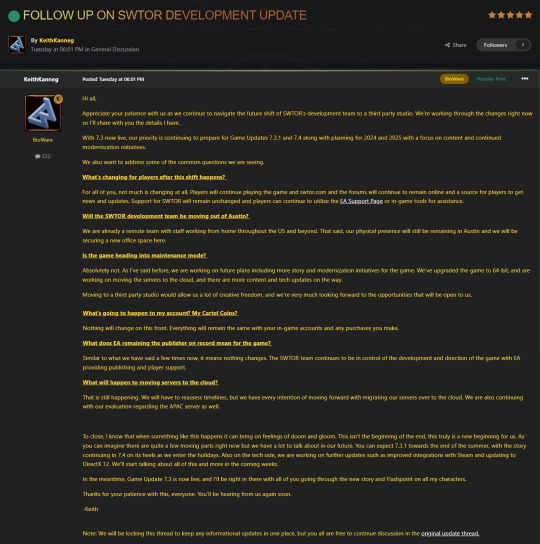#Remote Developers online in 2024
Explore tagged Tumblr posts
Text
Access the Benefits of Hiring Remote Developers online in 2024

Businesses have begun to turn to remote developers online to meet their software development requirements today. Many advantages contribute to driving this change. Employing remote developers online gives companies access to a worldwide talent pool with a wide variety of knowledge and experience. This guarantees that your development works are finished precisely and efficiently in addition to encouraging innovation. Today, businesses find remote development to be very cost-effective and beneficial............
#Hiring Remote Developers#Remote Developers online#Remote Developers#Remote Developers online in 2024
0 notes
Text
Touhou Spell Carnival for PC launches May 7 - Gematsu

The PC version of Touhou Spell Carnival will launch via Steam on May 7, publisher Idea Factory International and developers Compile Heart and Sting announced.
Touhou Spell Carnival first launched for PlayStation 5, PlayStation 4, and Switch on June 6, 2024 in Japan, and is on November 19, 2024 in the west.
A limited edition is also available via Idea Factory International’s Online Store.
Here is an overview of the game, via Idea Factory International:
About
Gensokyo—a remote land isolated from the Outside World, where humans and youkai live side-by-side. One day, the shrine maiden of Hakurei Shrine, Reimu Hakurei, spots mysterious pillars towering over various locations throughout Gensokyo. These pillars signaled the start of the Spell Carnival, a festival hosted by Yukari Yakumo where one must put their Spell Cards on the line in battle. In order to investigate the true intentions of Yukari Yakumo, who initiated the Spell Carnival so suddenly, Reimu Hakurei joins the fight for Spell Cards.
What is Touhou Project?
Touhou Project is a bullet hell shoot ’em up game created by ZUN’s group, Team Shanghai Alice. Set in the isolated land of Gensokyo, various incidents, known as disturbances, arise from different causes. The story follows the main protagonist, Reimu Hakurei, the shrine maiden of Hakurei Shrine, as she and her friends resolve these disturbances.
Key Features
Strategy RPG Meets Bullet Hell Mania – Battle in a grid system with a unique blend of real-time strategy elements and bullet hell madness! Hone your strategy skills by moving characters to gridspecific areas, grazing enemy bullets, and unleashing special skills in one simultaneous, action-packed battle!
Gotta Stay Prepped – Don’t just run into battle unprepared! Organize your party’s positioning on the grid, assign skills according to your enemies’ weaknesses, and choose wisely which Ace Spell Card you’ll use.
Need a Boost? – Players will occasionally see objects and Attributes during battle. Objects can block incoming bullets and provide additional effects once destroyed. Attributes can provide boosts and status effects. Use these boosts to your advantage, and maybe you’ll be able to collect extra loot from your victories!
Find Peace in the Hakurei Shrine – Explore the Hakurei Shrine through the lens of Reimu Hakurei! Keep tabs on any active missions, revisit sub-events, strike a pose with Photo Mode, and even talk to some of your favorite Touhou Project characters in Hakurei Shrine as you progress through the story!
7 notes
·
View notes
Text
The young developers are having the time of their lives. They pop open bottles of sparkling wine, eat steak dinners, play soccer together, and lounge around in a luxurious private swimming pool, all of their activity captured in photos that were later exposed online. In one picture, a man poses in front of a life-size Minions cardboard cutout. But despite their exuberance, these are not successful Silicon Valley entrepreneurs; they’re IT workers from the Hermit Kingdom of North Korea, who infiltrate Western companies and send their wages back home.
Two members of a cluster of North Korean developers, who allegedly operated out of Southeast Asian country Laos before being relocated to Russia by the beginning of 2024, are today being identified by researchers at cybersecurity company DTEX. The men, who DTEX believes have used the personas “Naoki Murano” and “Jenson Collins,” are alleged to have been involved in raising money for the brutal North Korean regime as part of the widespread IT worker epidemic, with Murano alleged to have previously been linked to a $6 million heist at crypto firm DeltaPrime last year.
For years, Kim Jong Un’s North Korea has posed one of the most sophisticated and dangerous cyber threats to Western countries and businesses, with its hackers stealing the intellectual property needed to develop its own technology, plus looting billions in crypto to evade sanctions and create nuclear weapons. In February, the FBI announced that North Korea had pulled off the biggest ever crypto heist, stealing $1.5 billion from crypto exchange Bybit. Alongside its skilled hackers, Pyongyang’s IT workers, who often are based in China or Russia, trick companies into employing them as remote workers and have become an increasing menace.
“What we’re doing isn’t working, and if it is working, it’s not working fast enough,” says Michael “Barni” Barnhart, a leading North Korean cyber researcher and principal investigator at DTEX. As well as identifying Murano and Collins, DTEX, in a detailed report about North Korean cyber activity, is also publishing more than 1,000 email addresses that it alleges to have been identified as linked to North Korean IT worker activity. The move is one of the largest disclosures of North Korean IT worker activity to date.
North Korea’s broad cyber operations can’t be compared with those of other hostile nations, such as Russia and China, Barnhart explains in the DTEX report, as Pyongyang operates like a “state-sanctioned crime syndicate” rather than more traditional military or intelligence operations. Everything is driven by funding the regime, developing weaponry, and gathering information, Barnhart says. “Everything is tied together in some way, shape, or form.”
The Misfits Move In
Around 2022 and 2023, DTEX claims both Naoki Murano and Jenson Collins—their real names are not known—were based in Laos and also travelled between Vladivostok, in Russia. The pair appeared among a wider group of possible North Koreans in Laos, and a cache of their photos were first exposed in an open Dropbox folder. The photos were discovered by a collective of North Korean researchers who often collaborate with Barnhart and call themselves a “Misfit” alliance. In recent weeks, they’ve posted numerous images of purported North Korean IT workers online.
North Korea’s IT workers are prolific in their activities, often trying to infiltrate multiple companies simultaneously by using stolen identities or creating false personas to try to appear legitimate. Some use freelance platforms; others try to recruit international facilitators to run laptop farms. While their online personas may be fake, the country—where millions do not have basic human rights or access to the internet—steers talented children into its education pipeline where they can become skilled developers and hackers. That means many of the IT workers and hackers are likely to know each other, potentially since they were children. Despite being technically adept, they often leave a trail of digital breadcrumbs in their wake.
Murano was first linked to North Korean operations publicly by cryptocurrency investigator ZachXBT, who published the names, cryptocurrency wallet details, and email addresses of more than 20 North Korean IT workers last year. Murano was then linked to the DeltaPrime heist in reporting by Coinbase in October. Members of the Misfits collective have shared photos of Murano looking pleased with himself while eating steak and a picture of an alleged Japanese passport.
Meanwhile, Collins, who DTEX included in its report and who was featured in swimming pool photos included in the Dropbox folder, was most commonly involved in IT work that generated revenue for Pyongyang, says narcass3, a member of the Misfits who asked to be identified by their online handle. “He seems to have mainly just worked on crypto/blockchain projects, including one which seems to be completely DPRK-backed or primarily made up of IT workers,” narcass3 says.
Evan Gordenker, a consulting senior manager at the Unit 42 threat intelligence team of cybersecurity company Palo Alto Networks, says he is familiar with the two personas identified by DTEX and other outlets and the cluster of North Korean workers that were based in Laos. The group were putting out a lot of job applications, creating fake personas, and searching for potential accomplices, the researcher says. “It seemed to me like they also enjoyed a level of autonomy that I don't think you tend to see for some of the [IT worker] groups,” Gordenker says. “I don't know if that’s because they generated more money and earned more privileges or just because they happened to have a group lead that operated in that way.”
An email address in Murano’s name bounced back when contacted by WIRED. Meanwhile an email address in Collins’ name did not respond to a request for comment.
Hiding in Plain Sight
Pyongyang’s IT workers have been operating for the best part of a decade, but attention on their activities has intensified in the past 12 months as Fortune 500 companies realized they have inadvertently hired North Koreans. Teams of hackers and IT workers are set “earnings quotas” by Kim Jong Un’s regime, Barnhart says, with IT workers operating from multiple North Korean military and intelligence organizations. One IT worker that made $5,000 per month could keep $200 of it, the investigator says.
Malicious IT workers, who may be likely to steal as well as earning money, are a part of the country’s recently revealed AI organization called 227 Research Center, which is part of the the primary intelligence agency the Reconnaissance General Bureau, while others are part of teams at the Ministry of National Defense, according to a cyber organization chart published by Barnhart in the DTEX report. IT workers that solely try to generate revenue from their jobs may be part of the Munitions Industry Department, the research says.
The relatively recent uptick in scrutiny around IT workers has come amid a growing US government crackdown: In May 2023 it sanctioned North Korean company Chinyong Information Technology Cooperation Company for employing IT workers in Laos and Russia, while at the start of this year two North Korean front companies and their China- and Laos-based bosses were sanctioned by the US Treasury Department. The Treasury said IT worker groups earn “hundreds of millions of dollars” for the regime, and thousands of IT workers are dispatched around the world.
“IT workers play the numbers game and are applying for remote roles in volume,” says Rafe Pilling, director of threat intelligence, at Sophos’ Counter Threat Unit. That means they often make errors. “They seem to operate at such a pace that they can make mistakes like leaving Github repositories of CVs and tools publicly accessible, leaving comments in code and scripts, making mistakes across CV’s that make them easier to spot as fakes, and slip-ups on camera during interviews that can reveal subterfuge.”
Alongside identifying Murano and Collins, DTEX also published more than 1,000 email addresses allegedly linked to North Korean IT worker operations that have been gathered through investigations and collaboration with researchers. Each email address has been provided by multiple sources, Barnhart says. A WIRED analysis of almost two dozen of the emails, using open-source intelligence tools and a database of material leaked online, shows few of them appear to have any signs of authentic online behavior; some email addresses are linked to online developer tools or freelancing websites, with others having very little online presence.
“There’s quite a bit of reuse of personas and some of them last years and years,” Unit 42’s Gordenker says. Others might be used just once, Gordenker says, but the scammers can quickly create new personas if needed. “You’ll see a persona that works, for instance, can sometimes have four or five, six different jobs across the lifespan.”
As more IT workers are identified, they are increasingly adopting their tactics to try to make themselves harder to spot. Multiple cybersecurity researchers have found North Koreans using face-changing software during video interviews or using AI assistants to help answer questions in real-time.
Changing Faces
The IT worker stands in the middle of the cramped room and poses for his photo. A clock on the wall reads 11:30. In the background, three other men wearing military uniforms hunch over computers. A rack of laundry appears at the back of the room in the photo, which was first published by DTEX. “There’s a lot to unpack in that one image,” Barnhart says.
Barnhart explains that while much is unknown about the photo, it reveals some details about how the group of IT workers operate. One of the men, in the far right corner of the photograph, appears to have WhatsApp messages open on his computer screen, with multiple chats ongoing. Attached to the wall above him is a surveillance camera.
“The MSS watches them so they don’t become defectors,” Barnhart says, referring to North Korea’s counterintelligence agency and secret police, the Ministry of State Security. As the men are based out of a small work space, they are likely to be lower down the pecking order of IT workers and will, like their compatriots, also face digital surveillance when they use their computers, he says. Barnhart says software he has seen monitors what the IT workers type and send on their devices. “They hate it,” he says. “It sends flags out to external servers whenever sexual imagery or sexual content is talked about or if Kim Jong Un [is mentioned].” Other researchers have spotted suspected IT workers ending job interviews when asked a variation on the question: “How fat is Kim Jong Un?”
While it’s unclear where the men in the room may be physically located, there are signs that the portrait photograph of the central subject has been used to create a false persona. Subsequent images obtained by Barnhart show the man edited into different clothes and turned into a cartoon-style illustration of his face.
“It shows him messing with the hairline. It shows him altering features, it shows him basically getting his profiles ready,” Barnhart says. One of these photos—of him edited into a leather jacket—appears on the website of “Benjamin Martin,” a self-styled web3 and full-stack developer.
Aside from appearing to be the North Korean from the IT worker photo, two of the companies listed on Martin’s online CV tell WIRED they have not heard of the persona, let alone employed him. One of the firms said it was not fully incorporated during most of the time the Martin persona listed he was working there. Martin did not respond to messages sent to the email listed on the developer webpage, while a Telegram account linked to a phone number on Martin’s website responded “yes” in a limited Chinese-language exchange when asked if they were a North Korean IT worker.
Ultimately, Barnhart says, people need to understand how North Korean hackers and IT workers are operating, with fluidity between groups and approaches, before significant disruption of their efforts can take place. “We need to refocus, we need to reshape,” Barnhart says. “North Korea has already moved on to their next point and now they're subcontracting and creating another layer of obfuscation there, too.”
5 notes
·
View notes
Text
🛑 Subscription Fatigue: You Don’t Own Sh-t Anymore

The Great Ownership Heist—And You Paid for It
Once upon a time, when you bought something, it was yours. Forever. No extra fees. No fine print. Just a simple transaction: money exchanged for permanent ownership.
Now? Welcome to Subscription Hell—where you don’t own sh-t anymore, but you sure as hell keep paying for it.
In the last 15 years, corporations have collectively f-cked us over by shifting from selling products to selling access. The goal? Make sure you never actually own anything again.
And somehow, we just let it happen.
📉 The Subscription Takeover: How You Got Trapped
Remember when you bought CDs and they were yours forever? When you bought a game and played it whenever you wanted, without an online connection or a monthly charge? When software didn’t demand a recurring payment just so you could type a damn document?
Those days are dead.
Instead of a one-time purchase, everything is now a rental. ✅ Music? Spotify. Apple Music. Tidal. ✅ Movies? Netflix. Disney+. HBO Max. (Oh wait—it’s just “Max” now because marketing execs are idiots.) ✅ Video Games? Xbox Game Pass. PlayStation Plus. Nintendo Switch Online. ✅ Software? Adobe Creative Cloud. Microsoft 365. Even f-cking calculator apps now have subscriptions.
Everything is locked behind a paywall. And the best part? You never actually own any of it.
💸 You Will Own Nothing—And Pay Monthly for It
We used to buy things. Now we “subscribe.” And this shift wasn’t an accident. It was a slow, calculated effort to make you permanently dependent on corporations.
Think about it:
A one-time purchase = company makes money once.
A subscription model = company makes money forever.
It’s not just greed—it’s financial entrapment.
📌 Want to listen to your favorite music? Too bad—Spotify just removed your favorite album. Pay up or be at the mercy of whatever they decide to keep. 📌 Want to keep using Photoshop? Adobe wants $20 a month for eternity. Cancel? Poof—no access. 📌 Bought a car? Congratulations! Your heated seats now require a f-cking subscription.
Wait. Cars?! Yes.
🚗 BMW’s $18-a-Month Heated Seat Scam: The Final Boss of Greed
If you want a perfect example of how far this bullsh-t has gone, look no further than BMW.
BMW now charges a subscription for heated seats in some of their cars. Yes, you read that right.
The seats are already installed. The heating element is physically there in the car you bought. But unless you pay BMW $18 a month, they won’t let you use it.
Let that sink in.
You own the car. You own the seats. But the company still controls what you can access.
It’s like buying a house and being told you have to pay a subscription to use your own kitchen.
This is the future.

🎮 Gaming: Where You Pay to Rent the Past
Gaming used to be simple. You bought a game. You played it. It was yours. Now? Everything is a f-cking subscription.
🎮 Xbox Game Pass – Pay monthly or lose access. 🎮 PlayStation Plus – Rent your library or watch it vanish. 🎮 Nintendo Switch Online – Oh, you thought you could play old NES games? Pay up.
And it gets worse.
Now, developers release unfinished games and patch them later. Want a full experience? Buy the DLC. Oh, you wanted to actually own the game? Too bad, it’s “live service” now.
In 2004, you could walk into a store and buy Halo 2, a complete game, for $50. In 2024, you spend $70 on a game that isn’t even finished and still get hit with battle passes, microtransactions, and pay-to-win mechanics.
And yet—we just accept it.
📚 Digital Books: You Don’t Even Own the Words Anymore
🚨 Amazon can delete books from your Kindle remotely. This isn’t a conspiracy—it already happened.
In 2009, Amazon literally deleted George Orwell’s 1984 and Animal Farm from people’s Kindles without warning. The irony? A dystopian book about government control vanished from devices overnight.
If you “buy” a Kindle book, you’re not actually buying it. You’re purchasing a license to read it.
This means:
If Amazon wants to remove it, they can.
If your account is banned, you lose everything.
If they change the Terms of Service, tough luck.
You don’t own sh-t. You’re just renting access to words on a screen.
💀 Welcome to the Paywall Apocalypse
Subscription fatigue isn’t just annoying. It’s economic warfare.
Everything is now a pay-per-month nightmare, and the endgame is control.
🔴 Digital art? Subscriptions. 🔴 Smart homes? Subscriptions. 🔴 Car features? Subscriptions. 🔴 F-cking TOOTHBRUSHES?! Yes, there’s now a subscription service for toothbrush heads.
The goal is simple: Make sure you never fully own anything again.
🛠️ Can We Fight Back?
Honestly? It’s hard. These companies engineered dependence so well that it’s nearly impossible to escape. But here’s what you can do:
✅ BUY physical media. DVDs, CDs, game cartridges—real sh-t that can’t be deleted remotely. ✅ AVOID auto-renewing subscriptions. Make them work for your money. ✅ Look for one-time purchase alternatives. Stop paying Adobe $600 a year for Photoshop when one-time payment alternatives exist. ✅ Support anti-DRM (Digital Rights Management) products. If a company lets you actually own what you buy, reward them.
We probably can’t stop the subscription model entirely, but we can slow it down by refusing to throw money at companies who abuse it.
🚨 FINAL THOUGHT: THEY DON’T WANT YOU TO OWN ANYTHING—BECAUSE OWNERSHIP IS POWER
Owning something means independence. Owning something means they can’t take it away. Owning something means freedom.
That’s why corporations are systematically stripping away ownership in favor of perpetual payments. They don’t want you to have assets—they want you to have bills.
Welcome to the new world order: 💰 Own nothing. Pay forever.
And the worst part?
We let them do it.
💀 REBLOG if you’re tired of paying for sh-t you should already own. 💬 COMMENT the worst subscription scam you’ve seen. 🥩 LIKE if you miss the days of actually owning things. 🚀 FOLLOW for more savage takes, economic red pills, and the dark truth about the world.
#SubscriptionFatigue#YouDontOwnShit#CorporationsAreEvil#DigitalScam#CapitalismAtItsWorst#GreedOverload#EconomicSlavery#PayForever#BrokenSystems#WTFCapitalism#HardPillsToSwallow#FactsOverFeelings#BigTechBullshit#BrutalHonesty#CulturalCritique#DarkAcademia#SavageCommentary
2 notes
·
View notes
Text
Business Visa in Thailand
1.1 Statutory Foundations
Governed by Immigration Act B.E. 2522 (1979), Sections 34-38
Implemented through Ministerial Regulation No. 17 (B.E. 2534)
Modified by Royal Decree No. 338 (B.E. 2562) for digital nomads
2. Eligibility Criteria and Documentation
2.1 Standard Requirements
Corporate Sponsorship:
Thai entity registration documents
BOI certificate (if applicable)
Shareholder structure diagram
Personal Documentation:
Passport (minimum 18 months validity)
4x6cm photos (white background)
TM.86 form (for in-country conversion)
2.2 Financial Thresholds
Company Capitalization:
THB 2M (foreign-owned)
THB 1M (BOI-promoted)
Salary Requirements:
Minimum THB 50,000/month
THB 200,000/month (SMART Visa)
2.3 Special Cases
BOI Companies: 7-day fast-track processing
Regional HQs: Reduced capital requirements
Startups: DEPA digital visa pathway
3. Application Process Mechanics
3.1 Consular Processing (Overseas)
Document Preparation (5-10 business days)
Legalization of corporate documents
Bank statement certification
Embassy Submission:
Appointment scheduling
Biometric collection
Processing Timeline:
Standard: 3-5 business days
Express: 24 hours (+50% fee)
3.2 In-Country Conversion
From Tourist Visa:
Must apply within 15 days of entry
Requires TM.87 form
Processing Stages:
Preliminary review (7 days)
Committee approval (15 days)
Visa stamping (3 days)
4. Work Permit Integration
4.1 Legal Requirements
Section 9 Alien Working Act:
Mandatory for all employment
Board positions require limited WP
Quota System:
1 foreigner per THB 2M capital
1 foreigner per 4 Thai employees
5. Compliance and Reporting
5.1 Ongoing Obligations
90-Day Reporting:
Online or in-person
THB 2,000 late fine
Tax Compliance:
Personal income tax filings
Withholding tax submissions
5.2 Renewal Process
Documentation:
Updated company financials
Tax payment receipts
Employee list
Timeline:
Begin 30 days before expiration
15-day processing standard
6. Special Economic Zone Provisions
6.1 Eastern Economic Corridor (EEC)
Fast-Track Processing: 5 business days
Work Permit Exemptions: For technical experts
Tax Incentives: 17% personal income tax cap
6.2 Border Trade Zones
Cross-Border Visas: Special 1-year permits
Local Employment: Relaxed quotas
7. Emerging Trends (2024 Update)
8.1 Digital Transformation
E-Work Permit Pilot: BOI companies only
Blockchain Verification: For document authentication
Automated Approval System: AI-assisted processing
8.2 Policy Developments
Salary Threshold Increases: Proposed 20% hike
Remote Work Provisions: Under consideration
ASEAN Mutual Recognition: For professional qualifications
8. Strategic Considerations
9.1 Application Optimization
Document Preparation:
6-month bank statement continuity
Precise job description wording
Timing Strategies:
Avoid December/January peak
Align with fiscal year
9.2 Risk Management
Compliance Calendar: Track all deadlines
Backup Plans: Contingency visa options
Professional Support: BOI-certified agents
#thailand#visa#immigration#thaivisa#immigrationinthailand#thaiimmigration#businessvisa#businessvisainthailand#thailandvisa#thailandbusinessvisa
2 notes
·
View notes
Text

For folks who play SW:TOR, there is an important update on the follow up of its development (following on from the recent news about SW:TOR moving from BioWare to Broadsword), from Keith Kanneg [source]. (click image for better view)
Text:
"FOLLOW UP ON SWTOR DEVELOPMENT UPDATE Hi all, Appreciate your patience with us as we continue to navigate the future shift of SWTOR’s development team to a third party studio. We're working through the changes right now so I'll share with you the details I have. With 7.3 now live, our priority is continuing to prepare for Game Updates 7.3.1 and 7.4 along with planning for 2024 and 2025 with a focus on content and continued modernization initiatives. We also want to address some of the common questions we are seeing. What’s changing for players after this shift happens? For all of you, not much is changing at all. Players will continue playing the game and swtor.com and the forums will continue to remain online and a source for players to get news and updates. Support for SWTOR will remain unchanged and players can continue to utilize the EA Support Page or in-game tools for assistance. Will the SWTOR development team be moving out of Austin? We are already a remote team with staff working from home throughout the US and beyond. That said, our physical presence will still be remaining in Austin and we will be securing a new office space here. Is the game heading into maintenance mode? Absolutely not. As I’ve said before, we are working on future plans including more story and modernization initiatives for the game. We’ve upgraded the game to 64-bit, and are working on moving the servers to the cloud, and there are more content and tech updates on the way. Moving to a third party studio would allow us a lot of creative freedom, and we're very much looking forward to the opportunities that will be open to us. What’s going to happen to my account? My Cartel Coins? Nothing will change on this front. Everything will remain the same with your in-game accounts and any purchases you make. What does EA remaining the publisher on record mean for the game? Similar to what we have said a few times now, it means nothing changes. The SWTOR team continues to be in control of the development and direction of the game with EA providing publishing and player support. What will happen to moving servers to the cloud? That is still happening. We will have to reassess timelines, but we have every intention of moving forward with migrating our servers over to the cloud. We are also continuing with our evaluation regarding the APAC server as well. To close, I know that when something like this happens it can bring on feelings of doom and gloom. This isn't the beginning of the end, this truly is a new beginning for us. As you can imagine there are quite a few moving parts right now but we have a lot to talk about in our future. You can expect 7.3.1 towards the end of the summer, with the story continuing in 7.4 on its heels as we enter the holidays. Also on the tech side, we are working on further updates such as improved integrations with Steam and updating to DirectX 12. We'll start talking about all of this and more in the coming weeks. In the meantime, Game Update 7.3 is now live, and I’ll be right in there with all of you going through the new story and Flashpoint on all my characters. Thanks for your patience with this, everyone. You’ll be hearing from us again soon. -Keith Note: We will be locking this thread to keep any informational updates in one place, but you all are free to continue discussion in the original update thread."
[source]
Some coverage on this:
PC Gamer: BioWare calls Star Wars: The Old Republic's change in developer 'a new beginning' and denies that it's going into maintenance mode
Eurogamer: BioWare assures Star Wars: The Old Republic isn't shutting down, despite new developer
40 notes
·
View notes
Text
Top Skills to Learn in 2024: Elevate Your Career with These In-Demand Abilities

In 2024, the job market continues to evolve rapidly, shaped by technological advancements and shifting workplace dynamics. To stay competitive, it’s essential to develop both soft skills and technical skills that employers value. This article explores the top skills to learn in 2024 and provides actionable tips on incorporating them into your job applications to boost your career prospects.
Soft Skills: A soft skill is one that is applicable to all occupations. They are generally more concerned in how you interact with others and manage the job. In other words, these are teamwork, work ethic, work style, or interpersonal skills. These abilities not only allow you to be more adaptable in your business, but they also benefit your personal life. Soft skills are very important to modern employers, and career coaching may help you learn how to improve your soft skills and discover areas where you can improve.
Communication
Effective communication abilities continue to be the most desired attribute by employers. Clear presentations, correspondence, and teamwork are ensured by effective communication, which encompasses both written and spoken abilities.
Why It’s Important: Clear communication fosters teamwork, reduces misunderstandings, and enhances productivity. How to Develop It: Join public speaking clubs like Toastmasters, practice writing concise emails, or take online courses on communication.
Analytical Thinking
People who can analyze data, approach problems logically, and come up with creative solutions are sought after by employers. In professions involving decision-making, analytical thinking is essential and enhances technical abilities.
Why It’s Important: Analytical thinkers can navigate complex challenges and offer data-driven insights. How to Develop It: Engage in activities like puzzles, logic games, or courses on critical thinking and problem-solving.
Project Management
With remote and hybrid work environments becoming the norm, project management skills are indispensable. These include planning, organizing, and overseeing projects to achieve goals efficiently.
Why It’s Important: Successful project managers ensure timely delivery, manage budgets, and lead teams effectively. How to Develop It: Earn certifications like PMP (Project Management Professional) or take online courses on project management tools like Trello and Asana.
Leadership
Leadership goes beyond managing a team — it’s about inspiring, motivating, and guiding others toward success. In 2024, inclusive and empathetic leadership is particularly valued.
Why It’s Important: Strong leaders foster a positive workplace culture and drive organizational growth. How to Develop It: Volunteer for leadership roles, mentor others, or study leadership styles through books or courses.
Adaptability
The pace of change in today’s world demands professionals who can adapt quickly to new technologies, roles, and environments. Adaptability is the key to thriving amid uncertainty.
Why It’s Important: It shows resilience and a willingness to embrace change, both critical traits in dynamic industries. How to Develop It: Push yourself out of your comfort zone by taking on new challenges or cross-functional roles. Technical Skills: The Backbone of Modern Careers
Generative AI Generative AI tools like ChatGPT, DALL·E, and Bard are revolutionizing industries. Professionals skilled in utilizing these tools for content creation, problem-solving, and data analysis are in high demand.
Why It’s Important: Generative AI enhances efficiency and creativity, making it a must-know for almost every sector. How to Develop It: Explore AI tools and complete online certifications in AI fundamentals and machine learning.
Data Analysis
Data analysis involves interpreting raw data to make informed decisions. From finance to marketing, data skills are essential for extracting actionable insights.
Why It’s Important: Companies increasingly rely on data to optimize operations and improve customer experiences. How to Develop It: Learn tools like Excel, SQL, Tableau, or Python for data analysis through platforms like Coursera or Udemy.
Software Development
The ability to design and develop software is critical for tech-heavy industries. With constant innovations, software developers are at the forefront of technological advancement.
Why It’s Important: Software drives automation, apps, and enterprise solutions that businesses depend on. How to Develop It: Start with beginner-friendly programming languages like Python or JavaScript, then build your portfolio by working on real-world projects.
UI/UX Design
UI/UX design ensures user-friendly and aesthetically pleasing digital experiences. Businesses are investing heavily in UX to retain customers and enhance brand loyalty.
Why It’s Important: Good design is the foundation of successful websites and apps. How to Develop It: Master tools like Figma, Adobe XD, and Sketch, and study UX principles through industry blogs and courses.
Web Development
Web development remains a cornerstone skill in the digital age. Whether it’s front-end, back-end, or full-stack development, expertise in creating robust websites is highly sought after.
Why It’s Important: Businesses need fast, secure, and responsive websites to stay competitive. How to Develop It: Learn coding languages like HTML, CSS, JavaScript, and frameworks such as React or Node.js. How to Incorporate These Skills When Applying for Jobs
Highlight Skills in Your Resume
Create a dedicated “Skills” section to list both technical and soft skills relevant to the job. Use metrics and examples in your experience section to showcase how these skills contributed to your success. Example: “Led a team of 10 to complete a software development project 15% ahead of schedule.”
Taior Your Cover Letter
Use your cover letter to explain how your skills align with the job description. Mention specific instances where you applied these skills to solve problems or achieve goals.
Provide Evidence During Interviews
Share anecdotes or STAR (Situation, Task, Action, Result) stories demonstrating your soft and technical skills. Example: “In my last role, I used data analysis to identify a trend that saved the company 20% in operational costs.”
Showcase Skills in Your Portfolio
For technical skills like web development or UI/UX design, create a digital portfolio to showcase your work. Include case studies, designs, or live projects to demonstrate your expertise.
Leverage LinkedIn
Keep your LinkedIn profile updated with your skills and certifications. Use LinkedIn endorsements and recommendations to validate your expertise.
Conclusion The top skills to learn in 2024 encompass a mix of soft skills like communication and leadership and technical skills like generative AI and data analysis. Mastering these skills will not only future-proof your career but also make you a standout candidate in any job application process.
Remember, learning doesn’t stop at acquiring new skills—showcasing them effectively is equally important. Start by setting goals, enrolling in courses, and applying these skills to real-world scenarios. With dedication, 2024 could be your year of unprecedented professional growth!
2 notes
·
View notes
Text
10 Easiest Ways to Make Money Online in 2024
In today's world, making money online is easier than ever. You can try freelancing, start an e-commerce business, or find passive income. This guide will show you the top 10 ways to earn money online in 2024.

CLICK HER TO SEE THIS AMAZING OFFER
Key Takeaways
Discover the power of online freelancing and how to leverage popular platforms like Upwork and Fiverr.
Learn about the thriving e-commerce industry and the potential of dropshipping and print-on-demand business models.
Explore passive income streams, including affiliate marketing, blogging, and selling digital products.
Understand the benefits of virtual assistant services and online tutoring as lucrative side hustles.
Gain insights into the latest trends and emerging opportunities in the world of online earning.
Online Freelancing: Unleash Your Skills
The digital age has opened up a world of opportunities. Now, you can make money from home. Online freelancing lets you show off your skills to people all over the world.
Leveraging Platforms for Gig Work
Platforms like Upwork, Fiverr, and Freelancer are great for freelancers. They let you work in areas like digital marketing, virtual assistant services, and online tutoring. It's easy to start: just make a profile, show your work, and bid on jobs.
These sites are perfect for those who want to earn money online. They offer flexibility and reach a global audience.
Building a Freelance Portfolio
A good portfolio is key to success in freelancing. It should show your best work and skills. It proves you can do great work.
Whether you're a designer, writer, or developer, a great portfolio attracts clients. It helps you find good online freelancing jobs.
"Freelancing has given me the freedom to work on my own terms and build a career that aligns with my passions. The ability to work remotely and set my own schedule has been life-changing."
youtube
CLICK HERE TO SEE THIS AMAZING OFFER
E-Commerce: Tap into the Digital Marketplace
The rise of e-commerce has opened up many chances to sell online. You can start with dropshipping or print-on-demand with little money. These ways let you sell many products without storing them, making it easy to start and grow.
Dropshipping: A Low-Risk Approach
Dropshipping means you don't store any products. When someone buys, you buy it from a supplier and they ship it. This way, you can start a business with almost no money, only paying for what's sold.
Print-on-Demand: Customizable and Scalable
Print-on-demand lets you sell custom items without managing inventory. You design things like t-shirts and mugs, and someone else makes and ships them. It's great for creative people to share their ideas worldwide.

Conclusion
The 10 easiest ways to make money online in 2024 offer many chances. You can work online or sell things online. These options fit many skills and interests.
You can use your skills on freelance sites, sell things online, or make money while you sleep. These ways are endless. By trying these methods, you can control your money and be free in the digital world.
Starting is the first step to success. So, why not try these ten must easiest ways to make money online 2024? You can make money without working hard, sell digital stuff, or write and share content. Your future is waiting for you.
#make money online#affiliatemarketing#usa#canada#australia#germany#money#inspiration#motivation quotes#Youtube
2 notes
·
View notes
Text


Navigating the Evolving Travel Trends: Past, Present, and Future✈️




The past five years have seen the travel industry undergo a seismic shift, shaped by unforeseen circumstances, evolving priorities, and technological advancements.

Past Trends (2019-2024):
1. Rise of Staycations and Local Travel: With global uncertainty, people sought comfort in familiar surroundings, boosting local tourism and staycations. This trend also fueled the popularity of unique, nearby experiences like glamping or micro-adventures.
2. Experiences over Destinations: Travelers craved deeper connections and immersion, prioritizing authentic experiences over simply ticking off landmarks. This led to a surge in cultural tours, voluntourism, and off-the-beaten-path adventures.
3. Bleisure Travel: The lines between business and leisure blurred as remote work options became more prevalent. Travelers extended business trips to include leisure activities, driving demand for flexible booking options and co-working spaces in tourist destinations.
4. Sustainability in Focus: Environmental consciousness grew, leading to a rise in eco-friendly travel choices. Travelers sought out sustainable accommodations, responsible tours, and destinations committed to conservation.
5. Tech-Driven Transformation: Technology played an increasingly crucial role, from AI-powered travel recommendations to contactless payments and immersive virtual tours. This trend also fueled the growth of travel apps and online booking platforms.

Possible Future Trends (2024-2029):
1. Hyper-Personalization: Travel will become increasingly tailored to individual preferences, with AI and machine learning creating bespoke itineraries and experiences based on unique interests, travel styles, and budgets.
2. Wellness & Retreats: The focus on mental and physical wellbeing will continue, with travelers seeking destinations and experiences that promote mindfulness, relaxation, and holistic rejuvenation.
3. Transformative Travel: The desire for personal growth and self-discovery will drive demand for transformative travel experiences, such as volunteering, cultural immersion programs, and journeys focused on personal development.
4. Space Tourism: As technology advances and costs decrease, space tourism could become more accessible, offering a unique and futuristic travel experience for a select few.
5. Metaverse Travel: Virtual and augmented reality experiences will continue to evolve, potentially offering immersive travel simulations that allow people to explore destinations without physically being there.

The past five years have painted a dynamic picture of travel trends. Driven by changing lifestyles, social values, and technological advancements, travelers have embraced experiences over mere sightseeing, pursued self-discovery through solo adventures, and sought responsible, personalized journeys.
Looking ahead, several exciting possibilities emerge. Hyper-personalization will be key, with tech facilitating highly customized itineraries that resonate deeply with individual aspirations. Wellness and retreat travel will boom, as people seek mental, physical, and spiritual rejuvenation. Additionally, destination stewardship will take center stage, with travelers actively partnering with locals to preserve cultures and environments.
This evolving landscape presents both challenges and opportunities. The travel industry must adapt to offer personalized experiences at scale, cater to the growing wellness market, and integrate sustainable practices seamlessly. Travelers, meanwhile, have the power to choose wisely, supporting responsible tourism and contributing to positive change.
While technology will play a vital role, human connection will remain paramount. Authentic interactions, cultural immersion, and meaningful experiences will be the true differentiators in this new era of travel. Ultimately, the future of travel promises a deeper, more personalized, and responsible way to explore the world, driven by our collective desire for connection, transformation, and discovery.
These are just a glimpse into the ever-evolving world of travel. As we move forward, sustainability, personalization, and transformative experiences will likely take center stage, while technology will continue to reshape how we plan, book, and experience travel. The future of travel promises to be exciting, diverse, and deeply attuned to the evolving needs and desires of travelers worldwide.

#travel writing & photography#travel writing#travel#adventure#blog#writing#trends#gif anime#gifset#dividers#cute#div cr plutism
9 notes
·
View notes
Text







It's Allen's time of the year. I had this silly little idea to test the remote option on my camera but I didn't think I would fall sick... anyways I tried. Overall I have to say the last months, starting from last December have been amazing in regards of Cosplay, I am thankful for all the people I got to meet and for all the positive words. And I have to thank myself for working on my self esteem, heck, I went on stage twice this year, I went to conventions completely alone without my friends. I had some very intense projects and this brings me so much, it feels like I finally can connect all my hobbies even more. 2024 will have even more Conventions for me, first time Dokomi for example, I might add some smaller cons when I feel like it. I want to add costumes to my current set up and am super hyped to work on each piece. I know make up is something I need to improve and don't let us start on wigs, but I am eager to learn and develop more skills. Thank you for everything this year.
I can't believe I dare to post photos of myself online, that I like myself on photos even. Ever since my childhood I hated my face and myself on photos, you have no idea how much it means to me that I actually like myself on photos. That I have printed photobooks with my face and not only dolls or landscape photos... it was hard work on myself and I'm glad I have people, friends... my found family who are supportive and allow me to be who I really am.
Little Bonus: Tribute to my first photoshooting as past!Allen from last year:


I don't think I will manage to write something this year as stress ate me and then falling sick ruined my plans, I now have time but lack the energy. But I'm trying to rest, I promise.
9 notes
·
View notes
Text
Best 10 Business Strategies for year 2024
In 2024 and beyond, businesses will have to change with the times and adjust their approach based on new and existing market realities. The following are the best 10 business approach that will help companies to prosper in coming year
1. Embrace Sustainability
The days when sustainability was discretionary are long gone. Businesses need to incorporate environmental, social and governance (ESG) values into their business practices. In the same vein, brands can improve brand identity and appeal to environmental advocates by using renewable forms of energy or minimizing their carbon footprints.
Example: a fashion brand can rethink the materials to use organic cotton and recycled for their clothing lines. They can also run a take-back scheme, allowing customers to return old clothes for recycling (not only reducing waste but creating and supporting the circular economy).
2. Leverage AI

AI is revolutionizing business operations. Using AI-fuelled solutions means that you can automate processes, bring in positive customer experiences, and get insights. AI chatbots: AI can be utilized in the form of a conversational entity to support and perform backend operations, as well.
With a bit more specificity, say for example that an AI-powered recommendation engine recommends products to customers based on their browsing history and purchase patterns (as the use case of retail). This helps to increase the sales and improve the shopping experience.
3. Prioritize Cybersecurity
Cybersecurity is of utmost important as more and more business transitions towards digital platforms. Businesses need to part with a more substantial amount of money on advanced protective measures so that they can keep sensitive data private and continue earning consumer trust. Regular security audits and training of employees can reduce these risks.
Example: A financial services firm may implement multi-factor authentication (MFA) for all online transactions, regularly control access to Internet-facing administrative interfaces and service ports as well as the encryption protocols to secure client data from cyberattacks.
4. Optimizing Remote and Hybrid Working Models

Remote / hybrid is the new normal Remote teams force companies to implement effective motivation and management strategies. Collaboration tools and a balanced virtual culture can improve productivity and employee satisfaction.
- Illustration: a Tech company using Asana / Trello etc. for pm to keep remote teams from falling out of balance. They can also organise weekly team-building activities to keep a strong team spirit.
5. Focus on Customer Experience
Retention and growth of the sales follow-through can be tied to high quality customer experiences. Harness data analytics to deepen customer insights and personalize product offers making your marketing campaigns personal: a customer support that is responsive enough can drive a great level of returning customers.
Example – For any e-commerce business, you can take user experience feedback tools to know about how your customers are getting along and make necessary changes. Custom email campaigns and loyalty programs can also be positively associated with customer satisfaction and retention.
6. Digitalization Investment

It is only the beginning of digital transformation which we all know, is key to global competitiveness. For streamlining, companies have to adopt the use advanced technologies such as Blockchain Technology and Internet of Things (IoT) in conjunction with cloud computing.
IoT example : real-time tracking and analytics to optimize supply chain management
7. Enhance Employee Skills
Develop Your Employees: Investing in employee development is key to succeeding as a business. The training is provided for the folks of various industries and so employees can increase their skills that are needed to work in a certain company. Employee performance can be enhanced by providing training programs in future technology skills and soft skills and job satisfaction.
Example: A marketing agency can host webinars or create courses to teach people the latest digital marketing trends and tools This can help to keep employees in the know which results in boosting their skills, making your campaigns successful.
8. Diversify Supply Chains

The ongoing pandemic has exposed the weaknesses of global supply chains. …diversify its supply base and promote the manufacturing of drugs in Nigeria to eliminate total dependence on a single source. In return, this approach increases resilience and reduces exposure to the risks of supply chain interruption.
- E.g., a consumer electronics company can source components from many suppliers in various regions. In so doing, this alleviates avoidable supply chain interruptions during times of political tensions or when disasters hit.
9. Make Decisions Based on Data
A business database is an asset for businesses. By implementing data, they allow you to make decisions based on the data that your analytics tools are providing. For example, sales analysis lets you track trends and better tailor your goods to the market.
Example: A retail chain can use data analytics to find out when a customer buys, and it change their purchasing policies. This can also reduce overstock and stockouts while overall, increasing efficiency.
10. Foster Innovation

Business Growth Innovation is Key A culture of creativity and experimentation should be established in companies. Funding R&D and teaming with startups can open many doors to both solve problems creatively but also tap into new markets.
Example: A software development firm could create an innovation lab where team members are freed to work on speculative projects. Moreover, work with start-ups on new technologies and solutions.
By adopting these strategies, businesses can navigate the turbulence for 2024 and roll up market — progressive.AI with an evolving dynamic market, being ahead of trends and updated is most likely will help you thrive in the business landscape.
#ai#business#business strategy#business growth#startup#fintech#technology#tech#innovation#ai in business
2 notes
·
View notes
Text
Top Work-from-Home Jobs for Housewives in 2024

Remote work has become more common because people understand that working from home using the Internet may be convenient. This change offers housewives a range of possibilities for organizing home chores and, at the same time, earning money.
Here is a list of the best home-based activities housewives can do in 2024.
Best Jobs for Housewives 2024
Some women feel dependent if she not earning even she’s a housewives. However, the Ludo real cash game that offers an opportunity to win Rs10 lakh by playing games, these women feel mentally independent and stress-free. So, apart from paying games, here’s a list of some of the best jobs for housewives in 2024.
1. Freelance Writing
Freelance writing is flexible because one can write in any area of interest or specialization. Whether content writing, blogging, copywriting or technical writing, there is always a great demand for well-written content.
Types of Writing Jobs:
Content Writing: Writing web content such as articles, blog posts, and other types of text on the websites.
Blogging: Specialized in blogging about similar topics and making money through ads and affiliate marketing.
Copywriting: Developing copy for brochures and other forms of promotion.
Technical Writing: Writing manuals, guides and other technical writing work.
Tips for Getting Started:
Building a Portfolio: Gather notes and past works to prove your ability and advertise yourself to the clients.
Joining Freelancing Platforms: Freelance marketplace sites such as Upwork, Fiverr, and Freelancer avail clients to writers seeking to offer a plethora of writing services.
2. Virtual Assistance
Virtual assistants provide administrative support to businesses and entrepreneurs remotely. Their tasks can vary widely depending on the client's needs.
Common Tasks and Responsibilities:
Email management entails replying to and organizing emails.
Organizing calendars and making appointments is called scheduling.
Taking care of questions and problems from customers is known as customer support.
How to Find Virtual Assistant Jobs:
Job boards: Virtual assistant jobs are listed on websites such as Indeed, FlexJobs, and Remote.co.
VA Agencies: These companies are experts at matching clients with virtual assistants.
Networking: Creating a network on social media and in business associations can help you get employment.
Necessary Skills and Tools Required:
Tech-savvyness, communication, and organizational abilities.
Working knowledge of Google Workspace, Microsoft Office, and project management apps like Asana or Trello.
3. Online Tutoring and Teaching
With the increasing popularity of online learning, the demand for online tutors and teachers has surged.
Subjects and Skills in High Demand:
Academic Subjects: Math, science, and languages.
Language Teaching: Teaching English or other languages to non-native speakers.
Music Lessons: Offering lessons in instruments or vocal training.
Platforms to Get Started:
VIPKid: Teaching English to students in China.
Chegg Tutors: Offering tutoring in various academic subjects.
Coursera: Teaching specialized courses to a global audience.
4. Social Media Management
Social media managers create and manage content for businesses and influencers on platforms like Facebook, Instagram, and Twitter.
Managing Social Media Accounts for Businesses and Influencers:
Content Creation: Developing posts, stories, and videos.
Analytics: Tracking engagement and performance metrics.
Engagement Strategies: Interacting with followers and responding to comments.
Essential Skills:
Content Creation: Writing, graphic design, and video editing.
Analytics: Understanding social media metrics.
Engagement Strategies: Knowing how to build and maintain a community.
Steps to Becoming a Social Media Manager:
Courses: Taking courses in social media marketing.
Certifications: Earning certifications from platforms like HubSpot or Hootsuite.
Networking: Joining social media groups and forums.
5. E-commerce and Online Selling
Online selling is one of the best work from home jobs for housewives that make them financially independent. Housewives can start their own online store or sell products on platforms like Etsy, Amazon, and eBay.
Popular Products to Sell:
Handmade Crafts: Jewelry, home decor, and personalized gifts.
Vintage Items: Clothing, accessories, and collectibles.
Digital Products: Printables, e-books, and courses.
Basics of Setting Up an Online Store:
Inventory Management: Keeping track of stock and supplies.
Marketing: Promoting products through social media and other channels.
Customer Service: Providing excellent service to retain customers.
6. Graphic Design
Graphic designers create visual content for businesses, including logos, websites, and marketing materials.
Tools and Software Needed:
Adobe Creative Suite: Photoshop, Illustrator, and InDesign.
Canva: A user-friendly design tool.
Tips for Building a Portfolio and Finding Clients:
Portfolio: Showcase your best work on a personal website or portfolio site.
Finding Clients: Use freelancing platforms and networks within the design community.
7. Data Entry and Transcription Jobs
Data entry involves inputting data into systems, while transcription entails converting audio recordings into text.
Necessary Skills:
Attention to Detail: Ensuring accuracy in data and transcripts.
Typing Speed: Fast and accurate typing.
Platforms to Find Work:
Upwork: A freelancing platform with data entry and transcription jobs.
Rev: Specializes in transcription services.
TranscribeMe: Offers transcription opportunities for beginners.
8. Online Surveys and Market Research
Participating in online surveys and market research studies can be an easy way to earn extra income.
Reputable Survey Sites and Research Panels:
Swagbucks: Offers surveys and other ways to earn points redeemable for gift cards.
Survey Junkie: Provides paid survey opportunities.
Vindale Research: Pays for participating in surveys and studies.
Tips for Maximizing Earnings and Avoiding Scams:
Maximizing Earnings: Sign up for multiple survey sites.
Avoiding Scams: Stick to reputable sites and never pay to join a survey site.
9. Affiliate Marketing
Affiliate marketing involves promoting products or services and earning a commission on sales made through your referral link.
Choosing a Niche and Promoting Products/Services:
Niche: Select a specific area of interest to focus on.
Promotion: Use a blog, social media, or a YouTube channel to promote products.
Creating a Blog or Website for Affiliate Marketing:
Blog: Write content related to your niche and include affiliate links.
Website: Build a dedicated site to promote affiliate products.
10. Customer Service Representative
Customer service representatives handle inquiries and issues from customers via phone, email, or chat.
Common Industries Hiring for Remote Customer Service:
Retail: Handling orders and returns.
Tech Support: Assisting with technical issues.
Finance: Managing account-related inquiries.
Required Skills and Qualifications:
Communication: Clear and effective communication skills.
Problem-Solving: Ability to resolve customer issues efficiently.
Platforms to Find Customer Service Jobs:
Indeed: Lists various remote customer service positions.
Remote.co: Specializes in remote job listings.
FlexJobs: Offers a wide range of remote job opportunities.
Conclusion
Working from home offers housewives the flexibility to balance their personal and professional lives while earning an income. Whether through freelancing, virtual assistance, online tutoring, or any of the other opportunities listed, there are numerous ways to embark on a rewarding work-from-home career. With dedication and the right skills, housewives can find fulfilling jobs that fit seamlessly into their daily routines.
#work from home#work from anywhere#jobs for housewives#real cash ludo#ludo game#ludo money#real money ludo games#ludo real money#ludo real money games#play ludo with real money india#ludo apps#indian ludo earning apps#ludo earning apps#ludo gaming#ludo money withdrawal
2 notes
·
View notes
Text
New Trends In 2024 Redefining Commercial Real Estate
The commercial real estate arena resembles a bustling metropolis, constantly evolving and adapting to new trends and demands. As we embark on the journey into 2024, let's explore the pivotal trends shaping this space and the implications for investors, developers, and industry experts alike.

Flexibility
The pandemic highlighted the necessity for flexible office spaces, revealing the importance of adaptable layouts and lease terms to accommodate evolving business requirements and workforce dynamics.
Co-working spaces and hybrid work models gain popularity as companies seek collaborative environments that can seamlessly transition between remote and in-office work settings.
Landlords respond to the demand for flexibility by offering versatile lease structures and agile space configurations, recognizing the value of accommodating diverse tenant needs.
There's a growing emphasis on spaces that can evolve alongside businesses, encourage innovation, and promote productivity through adaptable work environments.
Remote Work's Impact
Hybrid work models prompt a fundamental re-evaluation of office space utilization, leading to an increase in short-term lease renewals as companies navigate uncertainties surrounding their future workspace requirements.
Real estate professionals are tasked with navigating changing preferences and lease terms as businesses seek spaces that balance the benefits of remote work with the collaborative advantages of in-person interaction.
Companies are actively seeking office environments that support both remote and in-office work, driving the demand for flexible layouts, enhanced connectivity, and amenities that cater to diverse working styles.
The evolving space of remote work marks the need for commercial real estate stakeholders to remain agile and responsive to shifting tenant demands in an increasingly dynamic market.

Tech-Driven Amenities
Smart buildings with advanced security systems, integrated IoT devices, and energy-efficient features become standard offerings, enhancing operational efficiency and tenant satisfaction.
The integration of data analytics enables informed decision-making and optimization of space utilization, empowering landlords and managers of property to create personalized experiences tailored to tenant preferences.
Tech-centric amenities such as touchless access controls, interactive digital displays, and seamless connectivity encourage a modern and innovative workspace environment, driving tenant engagement and retention.
The convergence of technology and real estate highlights the importance of staying ahead of digital trends to remain competitive in an increasingly tech-savvy market landscape.
Sustainability
Eco-friendly construction practices and sustainable building designs gain momentum as investors and developers prioritize environmental responsibility and energy efficiency in commercial real estate projects.
Integration of renewable energy sources, green building materials, and efficient building systems has become standard practice, aligning with market expectations and regulatory requirements.
Sustainable operations and management practices, including waste reduction, water conservation, and carbon footprint mitigation, have become integral components of properties in Lucknow.
The emphasis on sustainability reflects a broader commitment to corporate social responsibility and resonates with tenants seeking environmentally conscious work environments.

E-commerce
Continued growth in e-commerce fuels demand for industrial and logistics space, driving investment in fulfillment centers, last-mile distribution hubs, and warehouse facilities.
The surge in online retail activity highlights the important role of industrial real estate in supporting the seamless flow of goods and services across supply chains.
Investors and developers capitalize on the sustained demand for industrial and commercial property for sale, recognizing the strategic importance of these assets.
The resilience of industrial real estate marks its status as a preferred asset class, offering stable returns and long-term growth potential amid shifting consumer preferences and market dynamics.
Retail Evolution
The retail sector marks a shift towards creating immersive and experiential destinations that go beyond traditional shopping experiences.
Mixed-use developments incorporating retail, dining, entertainment, and residential components gain momentum, catering to evolving consumer preferences for integrated lifestyle hubs.
Collaborative partnerships between retailers and landlords encourage creativity and reinvention, leading to the emergence of dynamic retail environments that blur the lines between commerce and entertainment.
Prioritizing Health and Wellness in Office Design
The pandemic focuses on a renewed focus on health and wellness in office environments, with employers prioritizing employee well-being to enhance productivity and retention.
Enhanced air quality systems, biophilic design elements, and access to outdoor spaces become integral features of office design, promoting physical and mental well-being.
Fitness centers, wellness programs, and ergonomic workstations are incorporated into office spaces to support employee health and foster a culture of wellness.
Tenant and employee programming initiatives further reinforce an approach to health and wellness, enriching the workplace experience and strengthening tenant engagement.

Premium Spaces
Employers place a premium on quality office spaces with modern amenities and superior infrastructure to attract and retain top talent.
The "flight to quality" trend drives increased demand for premium office buildings, prompting landlords to invest in building upgrades and amenities.
Enhanced common areas, amenities such as fitness centers, onsite dining options, and programming enhance the tenant experience and differentiate premium commercial property in the marketplace.
Landlords leverage quality building certifications and sustainability credentials to showcase the value proposition of premium spaces and attract tenants.
The Use Of AI
Artificial intelligence revolutionizes real estate marketing by providing data-driven insights, predictive analytics, and personalized customer experiences.
AI algorithms analyze vast datasets to identify market trends, predict commercial properties in Lucknow, and optimize marketing campaigns for targeted audience engagement.
Chatbots and virtual assistants enhance customer interactions, providing instant responses to inquiries, scheduling commercial property viewings, and delivering personalized recommendations.
Machine learning algorithms optimize ad placements, content delivery, and customer segmentation, driving efficiencies and improving marketing outcomes.
The Rise of VR and AR in Property Exploration
Virtual reality (VR) and augmented reality (AR) technologies reshape property exploration and marketing for people who want to buy property in Lucknow, providing immersive and interactive experiences for potential buyers and tenants.
Virtual tours, 3D renderings, and AR overlays enable users to visualize properties remotely and explore floor plans and amenities in a virtual environment.
VR and AR technologies enhance the accessibility and efficiency of property exploration, reducing the need for physical site visits and accelerating decision-making processes.
The adoption of VR and AR signifies a shift in how properties are marketed and experienced, offering new possibilities for engagement and storytelling in the commercial real estate industry.

Conclusion
Real estate in 2024 will welcome flexibility, technology, sustainability, and quality, which will be essential for success. The convergence of these trends presents both challenges and opportunities for investors, developers, and industry professionals. By staying attuned to evolving market dynamics and leveraging innovative strategies, stakeholders can navigate the complexities of the commercial real estate landscape and unlock value in the years ahead.
2 notes
·
View notes
Text
(Kyiv, June 20, 2024) – Russian authorities are suppressing the Ukrainian language and curriculum, imposing the Russian curriculum, anti-Ukrainian propaganda, and Russian as the language of instruction in schools in areas of Ukraine that Russia is occupying, Human Rights Watch said in a report released today. These measures violate the laws of armed conflict, which prohibit an occupying power from making unnecessary changes to laws in the occupied territory, as well as international human rights standards on the right to education.
The 66-page report “Education under Occupation: Forced Russification of the School System in Occupied Ukrainian Territories,” documents violations of international law by the Russian authorities in relation to the right to education in formerly occupied areas of Ukraine’s Kharkivska region, and other regions that remain under Russian occupation. Russian authorities have forced changes to the curriculum and retaliated against school staff who refused to make such changes with threats, detention, and even torture. Human Rights Watch also found that occupying authorities threatened parents whose children were learning the Ukrainian curriculum online.
“Russia should stop denying Ukrainian children their right to education as guaranteed to them under international law,” said Bill Van Esveld, associate children’s rights director at Human Rights Watch. “It should immediately cease attempts to Russify the education system and to carry out political indoctrination in occupied territories of Ukraine.”
Human Rights Watch interviewed 42 educators, school staff, and other officials in Kharkivska region after Russian forces left the area in September 2022, and interviewed teachers who had been displaced or escaped from the areas of Khersonska, Zaporizka, Donetska, and Luhanska regions that are currently under occupation.
Ukrainian experts estimate that one million school-age Ukrainian children remain in Russian-occupied territory. Data that the Ukrainian Ministry of Education and Science provided Human Rights Watch indicate that more than 62,400 children living in occupied areas continue to study in Ukrainian secondary education institutions remotely.
The laws of war require an occupying power to restore public order and services in the occupied territory, including to facilitate the proper education of children, but it must respect the laws in force in the territory before the occupation, and is prohibited from imposing its own laws, including laws on education.
The Russian school curriculum imposed in occupied areas of Ukraine includes history textbooks that justify Russia’s invasion, portrays Ukraine under its current government as a “neo-Nazi state,” and strictly limits instruction in the Ukrainian language. The United Nations Convention on the Rights of the Child guarantees children’s right to an education that develops respect for the child’s “own cultural identity, language and values,” as well as the “national values” of the child’s country of origin. Russia’s imposition of changes to education in occupied territories also violates other international human rights standards, including the prohibition against propaganda for war, the child’s right to mother-tongue education, and parents’ right of choice regarding their children’s education.
Ukrainian children under occupation also receive military training as part of the school curriculum. The United Nations Human Rights Monitoring Mission in Ukraine reported that Russian authorities require secondary schools in occupied Ukrainian territory to share the names of students ages 18 and older, whom the Russian authorities deem eligible to be drafted into the Russian armed forces.
Human Rights Watch found that occupying authorities retaliate against anyone, including in schools, who criticizes the invasion. Russian authorities and their proxies punished distance learning or teaching of the Ukrainian curriculum and threatened parents with fines, loss of custody of their children, and detention if they did not enroll their children in “Russian” schools, or if their children studied the Ukrainian curriculum remotely.
Occupying authorities also used coercion, detention, ill-treatment, and torture to pressure Ukrainian teachers to work with them or to hand over students’ files and other school data. The report documents the week-long detention, in dire conditions, of a school principal from Borivske village in Kharkivska region, whom security officers beat repeatedly for refusing to hand over information about his school.
In addition to the occupying authorities’ specific abuses, Russia’s full-scale invasion has placed a range of pressures on Ukraine’s education system, such as barriers to online learning, the burgeoning need for mental health support for students and teachers, and a negative impact on students with disabilities.
The report also documents the Ukrainian authorities’ problematic use of the criminal offence of “collaboration” against Ukrainian education staff who worked under Russian occupation, even though some teachers had to work under occupation to survive.
A letter from the Education Ministry to the heads of educational institutions and other officials in September 2022, which Human Rights Watch examined, warned educational workers that working in any managerial, teaching, or research position under the occupying authorities is “categorically unacceptable” and warrants a “severe” criminal penalty, even though occupying authorities used threats and violence to coerce educators to work in schools.
The laws of war do not directly address wartime collaboration but prohibit occupying forces from exercising coercion against civilians who are not their own nationals, anticipating occupying forces’ efforts to do so. They also require the occupying power to facilitate the proper working of institutions dedicated to the education of children, with the cooperation of the national and local authorities.
Given the context of occupation and teachers’ responsibilities to educate children, Human Rights Watch believes Ukrainian authorities should not penalize teachers in occupied territories solely for providing education to children under the Russian curriculum, and should revise their overly broad view of the offense of collaboration.
Ukrainian authorities and foreign donors should work with Ukrainian civil society groups to find ways to keep children connected to learning under occupation or during displacement by Russian forces, Human Rights Watch said.
“Russian authorities should ensure that education in occupied territories of Ukraine follows Ukrainian curricula and Ukrainian law,” Van Esveld said. “They should hold to account all occupation officials responsible for harassing, ill-treating, and putting undue pressure on Ukrainian education workers, students, and parents.”
17 notes
·
View notes
Text
Fulfill Your Dreams: How to Earn from Home Successfully

In 2024, the internet has opened up numerous opportunities for individuals to earn a substantial income from the comfort of their homes. With a wide range of online jobs available, it is now possible to pursue a lucrative career by mastering a job that aligns with your interests and expertise. The flexibility and convenience of working remotely enable you to earn a significant income while enjoying the comfort and convenience of your home.
It is essential to recognize that most methods of earning money online necessitate dedication, perseverance, and a patient approach. While the internet offers numerous opportunities to generate income, it typically takes time and effort to achieve meaningful results. Building a successful online venture or establishing a steady stream of online income often requires consistent work, learning, and adapting to the evolving digital landscape.
However, here are some ways you can make money online relatively quickly:
1. Affiliate Marketing: Affiliate marketing is promoting other people's products and earning a commission on each sale. You can start by creating a blog or a YouTube channel, and promote products related to your niche.
2. Freelance Work: If you have skills like writing, graphic designing, web development, or any other skill that can be offered as a service, then you can start freelancing on various online platforms. You can create a profile on websites like Upwork, Fiverr, Freelancer, and start getting clients from all around the world.
3. Online Teaching: If you have expertise in any subject, you can teach it online. You can offer classes on websites like Udemy, Skillshare, or Teachable. You can also offer personalized coaching or tutoring services.
4. Sell digital products: If you have skills like graphic design, programming, or writing, you can create and sell digital products like e-books, stock photos, or website templates on websites like Gumroad or Creative Market.
5. Dropshipping: Dropshipping is an e-commerce model where you don't have to maintain an inventory. You can create an online store, and when someone orders a product, you purchase it from a supplier who ships the product directly to the customer.
6. Online transcription: Some companies pay people to transcribe audio or video files into written documents. You can find transcription opportunities on websites like Rev or TranscribeMe.
7. Online Surveys: There are many websites that pay for completing online surveys. Though the pay is not very high, it can be a good source of side income. Some popular survey sites are Swagbucks, Survey Junkie, and Vindale Research.
Also, you can start your work in the freelance sector. If you learn any high-demand skill like Graphic Design- Digital Marketing-Video Editing so, you can earn huge money from that type of work.
Here you will find one of your most choice-full platforms where you can start your online Job from home.
Top 5 freelancing platforms:
1. Upwork
2. Freelancer
3. Fiverr
4. Guru
5. PeoplePerHour
Note that these are some ideas to start now, and your success in making money from home depends on various factors such as your skills, experience, dedication, and market demand. Hope you understand all and it will be helpful for you. Have a Nice journey.
#make money online#online business#freelancing#digital marketing#socialmediamarketing#affiliatemarketing#work from home
2 notes
·
View notes
Text
Digital Musculoskeletal (MSK) Care Market backed by virtual fitness, rising 18–20% CAGR by 2029
The global digital musculoskeletal (MSK) care market is expected to grow at a CAGR of 18-20% in the next 5 years. The aging patient population and high prevalence of MSK conditions, the rise in uptake of remote healthcare services post-COVID-19, advancements in wearable technology, significant investment into the digital MSK space, and growing demand to improve outcomes and make MSK care more convenient, accessible, and cost-effective are some of the key factors driving the digital MSK care market.
Digital musculoskeletal (MSK) care leverages digital health technologies and tools to advance the diagnosis, treatment, and management of musculoskeletal system conditions, affecting motor organs, muscles, tendons, bones, cartilage, ligaments, and nerves. Digital MSK solutions typically include online/virtual consultations, remote monitoring of patient symptoms and progress, digital pain management therapy programs, wellness and prevention programs, and digital platforms for self-assessment, self-management, and education. The objective of these solutions is to reduce the need for in-person visits and make MSK care more convenient, and accessible to improve patient adherence and outcomes.
To request a free sample copy of this report, please visit below https://meditechinsights.com/digital-musculoskeletal-care-market/request-sample/
The growing global burden of musculoskeletal disorders to propel market growth
Musculoskeletal disorders can have a significant impact on quality of life and healthcare costs. With the growth in the aging population and work-related MSK disorders, the prevalence of MSK conditions and associated functional limitations is rapidly increasing. According to WHO, MSK conditions affect more than 1.7 billion people worldwide and are a leading cause of disability. MSK conditions are the leading contributor to disability worldwide, with low back pain being the single leading cause of disability in 160 countries. Digital MSK has increasingly gained traction in recent years, mainly post-COVID-19 pandemic, which has led to a rise in remote healthcare services. With the growing burden of MSK and the advantages associated with the use of digital pain management and monitoring solutions, the demand for digital MSK care solutions is expected to grow in the coming years.
Significant investments in digital MSK space to further drive the market growth
The digital health market is witnessing growing investment in companies offering solutions for musculoskeletal conditions. MSK digital health solutions raised $223 mi till June 2024, which was already nearly double that of the previous year’s $125 mi. Some of the recent deals include Sword Health, an AI-powered virtual physical therapy startup, that has raised $30 mi in June 2024 bringing Sword’s total funding to $340 mi and the nine-year-old company’s valuation to $3 bn. In Feb 2023, Digital MSK health company IncludeHealth raised $11 mi in a funding round led by CincyTech with participation from Tamarind Hill and other investors. Such funding would promote innovation in the digital MSK space thereby further boosting the market growth.
Competitive Landscape Analysis
The global digital MSK care market is marked by the presence of innovative and emerging market players such as Hinge Health, Sword Health, Omada Health, Kaia Health, Upswing Health, RecoveryOne, Spinezone, Dario Health, IncludeHealth, Vori Health, getUbetter, RealizedCare; among others. Some of the key strategies adopted by market players include product innovation and development, and strategic partnerships and collaborations.
🔗 Want deeper insights? Download the sample report here: https://meditechinsights.com/digital-musculoskeletal-care-market/request-sample/
Market Segmentation
This report by Medi-Tech Insights provides the size of the global digital musculoskeletal (MSK) care market at the regional- and country-level from 2022 to 2029. The report further segments the market based on solution, condition, and end user.
Market Size & Forecast (2022-2029), By Solution, USD Million
Online/Virtual Consultations
Pain Management Therapy Programs
Remote Monitoring
Others
Market Size & Forecast (2022-2029), By Condition, USD Million
Back Pain
Foot & Ankle Pain
Knee & Lower Leg Pain
Neck & Shoulder Pain
Pelvis, Hip & Thigh Pain
Others
Market Size & Forecast (2022-2029), By End User, USD Million
Healthcare Providers
Healthcare Payers
Employers
Individuals/Patients
Others
Market Size & Forecast (2022-2029), By Region, USD Million
North America
US
Canada
Europe
UK
Germany
France
Italy
Spain
Rest of Europe
Asia Pacific
China
India
Japan
Rest of Asia Pacific
Latin America
Middle East & Africa
About Medi-Tech Insights
Medi-Tech Insights is a healthcare-focused business research & insights firm. Our clients include Fortune 500 companies, blue-chip investors & hyper-growth start-ups. We have completed 100+ projects in Digital Health, Healthcare IT, Medical Technology, Medical Devices & Pharma Services in the areas of market assessments, due diligence, competitive intelligence, market sizing and forecasting, pricing analysis & go-to-market strategy. Our methodology includes rigorous secondary research combined with deep-dive interviews with industry-leading CXO, VPs, and key demand/supply side decision-makers.
Contact:
Ruta Halde Associate, Medi-Tech Insights +32 498 86 80 79 [email protected]
0 notes